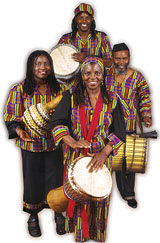
The Winston-Salem-based group Healing Force perform at this year’s Kwanzaa celebration at the YMI Cultural Center.
|
Radio stations don’t play Kwanzaa songs. Homes aren’t draped in Kwanzaa decorations. And no stores in Asheville are putting anything on sale to commemorate the celebration’s recurrence on the calendar.
If you’re not among the 18 million people who annually observe Kwanzaa, it’s easy to overlook the largely misunderstood holiday. But for the African-Americans who celebrate Kwanzaa each December, this is an important time for family, community, introspection and reflection.
Kwanzaa does not supplant faith-based holidays such as Christmas, but supplements them by cultivating intraracial cultural awareness.
“It is not a religious holiday,” explains John Hayes, president of the Asheville chapter of the NAACP, “It goes back to research about what it is that could unite us and bring us back into rediscovering our roots and culture.”
Kwanzaa is rooted in several different seasonal and cultural African traditions, though the holiday didn’t originate there. Kwanzaa was created in 1966 by Ron Maulana Karenga, a former Black Panther and leader of the United Slaves, a Black nationalist group. Karenga’s theory was that by creating an annual holiday with its own set of symbols and traditions, it would help to preserve a connection with their ancestral roots for people of African descent.
The name Kwanzaa comes from the Swahili expression matunda ya kwanza, which translates as “first fruits.”
“It has to do with harvest,” says Hayes, “Harvest of the mind, harvest of the family. It is a time to come together and to celebrate our first fruit, which is our children.”
Kwanzaa is designed to be a time to focus on seven key African principles, or, as they are known in Swahili, Nguzo Saba. The principles are unity (umoja), self-determination (kujichagulia), collective work and responsibility (ujima), cooperative economics (ujamaa), purpose (nia), creativity (kuumba) and faith (imani). Each day of the festival is meant to focus on and observe one of these principles. “The only gift given during the celebration,” says Hayes, “is books. It is a time for us as parents and grandparents to get the type of books that will tell them what came about.”
Here in Asheville, a Kwanzaa celebration is hosted annually by the YMI Cultural Center. “We condense it into one day,” says Harry Harrison, the YMI’s executive director, explaining the concession to busy schedules, “but we try to focus on principles that will keep the African-American community strong not just for one day, but all year long.”
This year’s event will be curated by The Healing Force, a Winston-Salem-based performance troupe that specializes in Kwanzaa celebrations. They will be performing traditional African dance and drumming routines, telling stories, and hosting a children’s drumming workshop.
“You don’t say Happy Kwanzaa,” explains Hayes, “Because it’s about harvest, and you want your harvest to be bountiful, to be blessed. So that’s what you say, mzuli Kwanzaa, a blessed Kwanzaa.”
[Ethan Clark is an Asheville-based freelance writer and cartoonist.]
The Kwanzaa celebration runs 3-5 p.m. on Saturday, Dec. 30, with a special children’s drumming workshop at 2 p.m. Ray Auditorium, 39 S. Market St. 252-4614. $3 requested donation.



Before you comment
The comments section is here to provide a platform for civil dialogue on the issues we face together as a local community. Xpress is committed to offering this platform for all voices, but when the tone of the discussion gets nasty or strays off topic, we believe many people choose not to participate. Xpress editors are determined to moderate comments to ensure a constructive interchange is maintained. All comments judged not to be in keeping with the spirit of civil discourse will be removed and repeat violators will be banned. See here for our terms of service. Thank you for being part of this effort to promote respectful discussion.